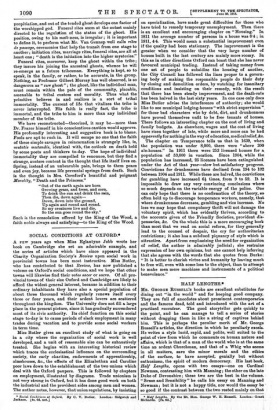SOCIAL CONDITIONS AT OXFORD.*
A FEw years ago when Miss Eglantyne Jebb wrote her book on Cambridge she set an admirable example, and the series of articles which have since appeared in the Charity Organization Society's Review upon social work in provincial towns has been most instructive. Miss Butler, who has contributed to that Review, has now published a volume on Oxford's social conditions, and we hope that other towns will likewise find their vales sacer or sacra. Of all pro- vincial towns of their size Oxford and Cambridge are likely to afford the widest general interest, because in addition to their ordinary inhabitants they have also a special population of about three thousand which regularly renews itself every three or four years, and their ardent lovers are scattered throughout the kingdom. The University does not fill a large place in the present picture, since it has gradually surrendered most of its civic authority. Its chief function on this social stage to-day is to cause periods of slack employment in many trades during vacation and to provide some social workers in term time.
Miss Butler gives an excellent study of what is going on in a city where the organization of social work is well developed, and a unit of reasonable size can he exhaustively treated. She begins with an interesting historical review which traces the ecclesiastical influence on the surrounding society, the early charities, endowments of apprenticeship, almshouses, &c., the effects of the Elizabethan and Caroline poor laws down to the establishment of the two unions which deal with the Oxford paupers. This is followed by chapters on employment, illustrated by diagrams. Trade unionism is not very strong in Oxford, but it has done good work on both the industrial and the provident sides among men and women. The author notes, however, that union regulations, by insisting
• Social Conditions at 0.1ford. By C. V. Butler. London: Sidgwick and Jackson. [4s. 6d. net.] on specialization, have made great difficulties for those who have tried to remedy temporary unemployment. Then there is an excellent and encouraging chapter on "Housing." In 1811 the average number of persons in a house was 6.4 ; in 1911, 4.4. This would mean a substantial improvement even if the quality had been stationary. The improvement is the greater when we consider that the very large number of houses built in the last century are mainly more roomy. In this as in other directions Oxford can boast that she has never favoured municipal trading. Instead of taking money from one set of people to subsidize the housing of another, the City Council has followed the lines proper to a govern- ing body of making the responsible people do their duty by closing and demolition orders, by watching for insanitary conditions and insisting on their remedy, with the result that there has been steady improvement, and the death-rate has been halved in the last sixty years. In one case only does Miss Butler advise the interference of authority; she would like to see municipal lodging-houses " with strict supervision" for those bad characters who by debt, dirt, and drunkenness have proved themselves unfit to be free tenants of houses. There follows an interesting chapter on the cost of living and family budgets. As elsewhere, wages and the cost of living have risen together of late, while more and more can be had apparently for nothing in the way of education, medical relief, &c.
The chapter on Temperance tells us that in 1639, when the population was under 8,000, there were " above 300 ale-houses." In 1911 there were 253 licensed houses for a population of 53,000 in vacation. Since 1904, while the population has increased, 25 licences have been extinguished under the Act of that year—slow but satisfactory progress. Convictions for drunkenness have declined from 194 to 102 between 1904 and 1911. While these are halved, the convictions for gambling have increased 6i times, from 9 to 59. It is impossible to draw any very convincing conclusions where so much depends on the variable energy of the police. One can only hope that there is no confirmation of the theory, so often held up to discourage temperance workers, namely, that where drunkenness decreases, gambling and vice increase. No less we may hope that compulsory thrift will not damage the voluntary spirit, which has evidently thriven, according to the accounts given of the Friendly Societies, provident dis- pensaries, &c. On the whole this is a more encouraging book than most that we read on social reform, for they generally lead to the counsel of despair, the cry for authoritarian restrictions ; it also has a subdued piquancy of style which is attractive. Apart from emphasizing the need for organization of relief, the author is admirably judicial ; she restrains expression of her own opinions, but one cannot help inferring that she agrees with the words that she quotes from Burke: " It is better to cherish virtue and humanity by leaving much to free will, even with some loss to the object, than to attempt to make men mere machines and instruments of a political benevolence."


























































 Previous page
Previous page